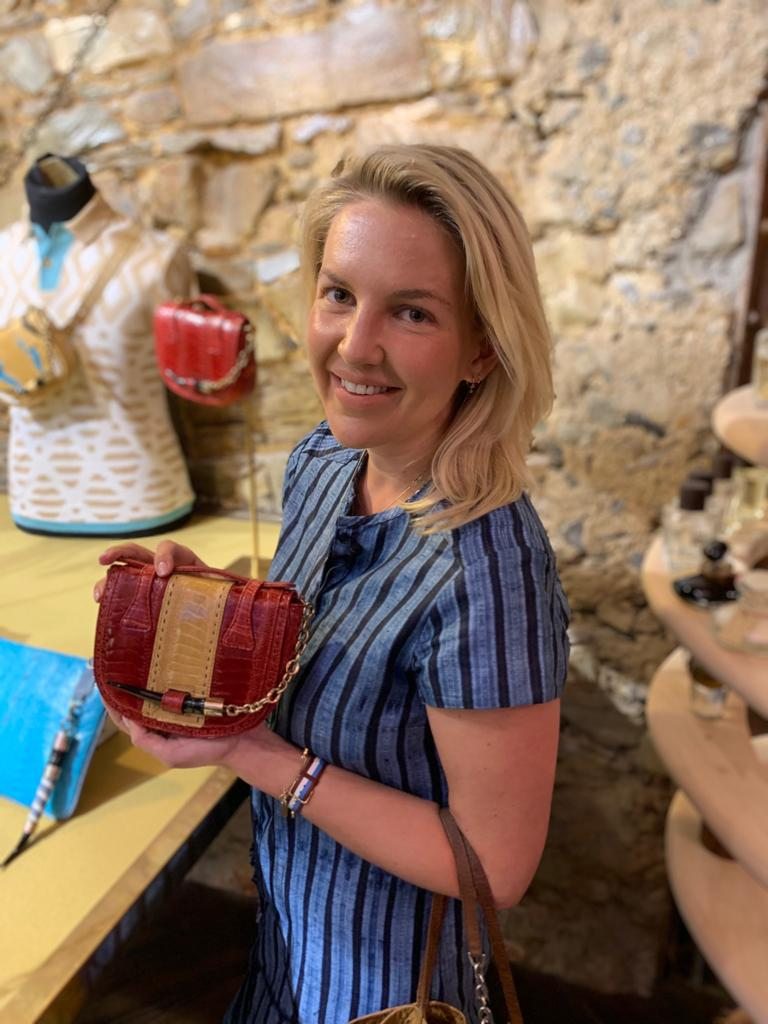Apr 15, 2019
Hanneli Rupert defends use of exotic skins in South Africa
Apr 15, 2019
Hanneli Rupert, daughter of Johann Rupert, chairman and controlling shareholder of Cartier and Chloe-owner Richemont, has emerged as a bold countercurrent voice in the fashion world, defending the use of exotic leather while the rest of the industry has been moving away from it.

The 34-year-old South African entrepreneur runs Merchants on Long, a fashion concept store she founded in Cape Town a decade ago that specializes in African designers’ clothes and accessories sourced in Africa.
Her shop also stocks her own leather goods brand Okapi, handbags made with ostrich, springbok and blesbok (a type of South African antelope) leathers. Rupert argues that the skins of animals such as ostriches and springbok are byproducts of the food industry which would otherwise be wasted if they were not turned into leather.
She also pointed out that ostrich was the animal that had the lightest footprint in terms of carbon emissions, emitting significantly less greenhouse gases than cows and also used much less water.
“If you are a vegan and that is your belief system, then that is fine and I respect that, but I eat meat and I would rather not see waste, a byproduct which would otherwise be thrown away,” Rupert told FashionNetwork.com in an exclusive and rare interview. “So that is the stance we take and I can defend that.”
Okapi bags, whose logo represents two okapi, come in bright colors such as fuchsia and turquoise and carry a distinct African artisanal look and feel. They started selling on website Net-A-Porter earlier this month, with prices starting at £450. Rupert said sales had enjoyed a strong start.
In the past two to three years, the fashion industry has been turning its back on the use of exotic skins and fur in response to the ever more vocal global vegan movement against animal cruelty. The movement has been fueled by the well-financed PETA lobby that regularly broadcasts videos showing animals such as rabbits, snakes and crocodiles skinned while still barely alive. In December, Chanel announced it would no longer use exotic skins as it was facing increasing difficulty finding ethical suppliers. Several brands including Victoria Beckham and Vivienne Westwood have followed suit and even London retailer Selfridges announced that it was no longer going to stock exotic skins after having already stopped selling fur. Fur was first on fashion’s casualty list and now almost every major fashion brand including Gucci, Armani and Burberry, has stopped using fur. Even the city of New York is considering introducing a law that would ban the sale of the material.
However, some critics question what the difference is between a mink living a miserable life in a cage, and a cow taken away from its mother right after birth and confined to a box until it is slaughtered for meat and its hide turned into handbags and shoes. Late Fendi and Chanel designer Karl Lagerfeld had previously made a similar point, arguing that those who demanded the end of fur had to be consistent and also call for a leather ban.
Rupert said she vetted as much as possible the sourcing of Okapi hides and the production process of her bags and that of the brands Merchants stocked. “There are lots of different stories and I think consumers should educate themselves around facts and numbers,” Rupert said. “I think at this stage in time, people are very polarized on certain issues.”
Rupert would not be drawn on talking about her family which has been often the target of anti-white capitalist movements in South Africa. The country will be holding presidential elections next month. There are plans to change the constitution to allow expropriation without compensation.
“Politics is important if you are a concerned citizen but politics I see as separate from what we are doing with Merchants and the designers. We showcase a different side to South Africa but which is very much a reality, and there is so much talent and beauty in this country.”
Rupert would not talk about her father or any advice he might have been giving her. Her younger brother Anton Rupert, now 30, joined Richemont’s non-executive board in 2017 as part of a drive to bring in younger profiles.
Copyright © 2024 FashionNetwork.com All rights reserved.


























